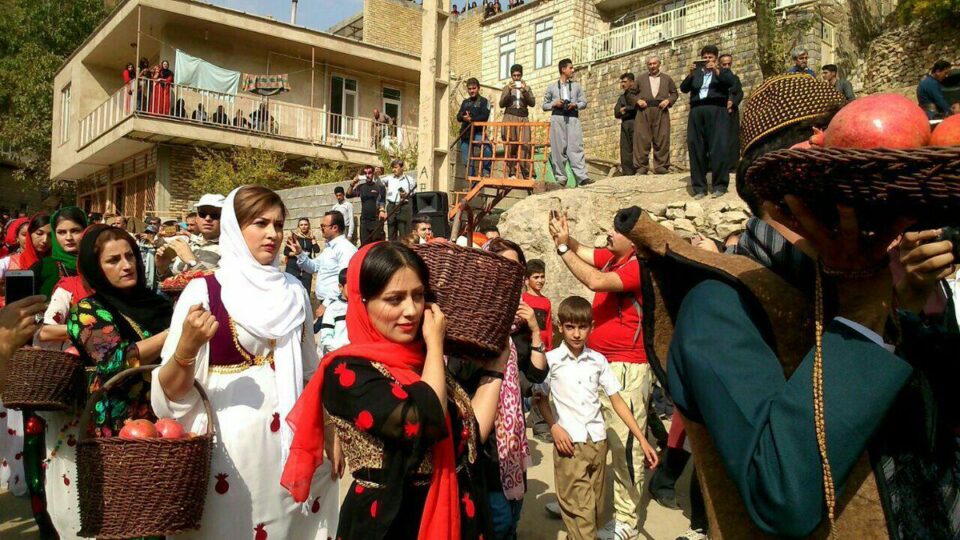An ancient Zoroastrian tradition celebrating mid-summer harvest with music, dance, and
Yarsani (Kakai) religious adherents have a number of religious and social events, rituals, and customs that reflect their beliefs and ideals and are entwined with Kurdistan’s natural environment. These are observed in many districts of Eastern Kurdistan, particularly in Kermanshah Province.
The Chle Hawine festival is one of these traditions; it takes place every year for three days in the middle of summer, just when the summer heat starts to cool off and the agricultural produce harvest season starts. Many customs are followed during this event, which is attended by women, girls, boys, and old people alike. The Chle Hawine ceremony is held in the village of “Zardouyi,” which is part of the “Baingan” district in the “Paveh” county of Kermanshah Province.
This festival is one of the ancient and social celebrations of the Yarsani faith followers. The tradition is held to mark the passing of midsummer, the beginning of the temperature decline, and the start of the ripening season for vineyard and orchard products like pomegranates, figs, grapes, walnuts, and apples. It involves creating “dahol” (a type of drum), playing the daf instrument, singing songs and religious hymns, dancing by girls and boys, and distributing orchard products. This ritual, which has survived for hundreds of years, is conducted as a cultural and religious ceremony.
“Zardouyi, Rawan, or Rawan Zardouyi,” also known as “Atourge,” is located in the “Makwan” area. It is home to 258 families, and its history dates back to before the arrival of the Islamic army. According to the villagers’ belief, the name Zardouyi comes from Mithraism and later Zoroastrianism, while its earlier name (Atourge) means fire temple. In Zardouyi village, there’s a handwritten copy of the Quran known as the “Bain Quran.” According to archaeological experts, this Quran dates back to the Timurid era and is currently preserved in the village mosque, attracting many visitors annually.
Zardouyi village is one of the ancient and historical villages in the area, containing several pre-Islamic graves and remains of Zoroastrian fire temples, indicating the diverse beliefs and religions of the local people in that era.
The tomb and headquarters of “Ama Madran” is in this village. According to local beliefs and narratives, he was the brother of “Pir Mikael,” one of the great religious followers in ancient times. Also, the tomb and shrine of “Hazrat Dauood,” one of the followers of the Yarsani religion and companions of Sultan Sahak (Isaac), is near Zardouyi village. All these religious, natural, and historical features have become an important source for the religious, tourist, and cultural fame of the Zardouyi area.
Due to its geographical location and the annual celebration of several festivals and traditions in different seasons, Zardouyi is considered one of the tourist areas of Kermanshah Province. It’s one of the few villages with no unemployed residents, where everyone is engaged in some work. The villagers are energetic, lively, and familiar with the “Hawrami, Old Gorani, and Jafi” dialects.
The “Nowruz Fire” festival, which is specially celebrated during Nowruz, along with the “Pomegranate and Thanksgiving” festivals in autumn, the release of partridges, and the burning of axes, cages, and traps, are among the annual celebrations in this village. The culture of nature preservation is very strong in this village, all of which have become opportunities for attracting tourists and creating a unique culture for the village.
Apart from these features, on September 2, 1988, despite the approval of UN Security Council Resolution 598 and the end of the Iran-Iraq war, Zardouyi village was bombed with five chemical bombs by the Iraqi army. In this incident, 275 people who had gathered for the Yarsani religious ceremony at the tomb of Hazrat Dauood lost their lives.

